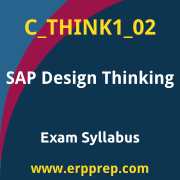 Welcome to our comprehensive guide for the SAP Design Thinking Certification Exam. This page provides all the essential details you need to prepare effectively for the SAP Design Thinking exam. This certification is ideal for candidates with a background in SAP Other and business consulting who aspire to become SAP consultants. The exam confirms your fundamental knowledge and proven skills in SAP Certified Associate - Design Thinking, ensuring you can apply this knowledge practically in projects under experienced guidance. Achieving this SAP C_THINK1_02 certification will significantly enhance your career prospects and demonstrate your expertise to potential employers.
Welcome to our comprehensive guide for the SAP Design Thinking Certification Exam. This page provides all the essential details you need to prepare effectively for the SAP Design Thinking exam. This certification is ideal for candidates with a background in SAP Other and business consulting who aspire to become SAP consultants. The exam confirms your fundamental knowledge and proven skills in SAP Certified Associate - Design Thinking, ensuring you can apply this knowledge practically in projects under experienced guidance. Achieving this SAP C_THINK1_02 certification will significantly enhance your career prospects and demonstrate your expertise to potential employers.
How SAP Design Thinking Certification Can Boost Your Career
The SAP C_THINK1_02 exam is globally recognized for validating your knowledge and skills. With the SAP Certified Associate - Design Thinking credential, you stand out in a competitive job market and demonstrate your ability to make significant contributions within your organization. This exam tests your proficiency in various syllabus topics, ensuring a well-rounded understanding of the consultant profile.
SAP Design Thinking Certification Details:
| Exam Name | SAP Certified Associate - Design Thinking |
| Exam Code | C_THINK1_02 » SAP Design Thinking Certification Online Practice Test |
| Level | Associate |
| Exam Price | $1308 USD – Includes 1 Year SAP Learning Hub access and 4 exam attempts. |
| Duration | 180 mins |
| Number of Questions | 80 |
| Cut Score | 66% |
| Reference Books / Trainings | |
| Schedule Exam | SAP Learning |
| Sample Questions | SAP C_THINK1_02 Certification Exam Sample Question |
| Recommended Practice | SAP Design Thinking Certification Practice Test |
SAP C_THINK1_02 Exam Syllabus Topics:
| Topic Areas | Weighting |
|---|---|
|
Validation & Implementation
|
< 8% |
| Ideation | 8% - 12% |
| Prototyping | 8% - 12% |
|
Design Thinking Methodology and Principles
|
> 12% |
|
Scoping / Understand
|
> 12% |
|
Research / Observe
|
> 12% |
|
Synthesis / Define Point-of-View
|
> 12% |
|
Post production & Facilitation
|
> 12% |
SAP Education has designed this certification exam to assess SAP skills based on a comprehensive understanding of SAP Design Thinking. SAP offers certifications at associate, specialist, and professional levels, tailored to the candidate's experience and domain expertise. To ensure success in the SAP Design Thinking Certification Exam (C_THINK1_02), SAP recommends a combination of education courses and hands-on experience. This approach helps you effectively apply the knowledge gained from training and professional experience in the exam.
